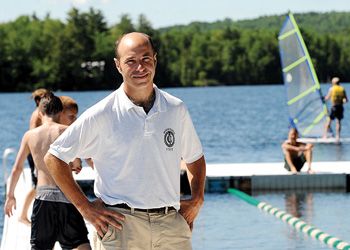Happy campers? | Hopes to revive enrollment at summer camps are pinned on new ad campaign
For decades, thousands of children have flocked to western Maine from around the country, and the world, each summer to take part in an age-old ritual: summer camp.
According to Andy Lilienthal, director of Camp Winnebago in Fayette, Maine camps are ingrained in American culture.
“Historically, Maine has been the destination for many people in terms of summer camps,” he says. “There are many camps that have been around for 90 or 100-plus years, and I don’t think it’s an accident that many people who are doing very positive, influential work around the world have attended Maine camps. It’s a combination of the traditions and the programming and the people who are associated with these organizations that really build trajectories and vision and values. You really can’t replicate it anywhere else.”
That message — that you can’t have a Maine youth camp experience anywhere else — is being hammered home with a new marketing campaign to reclaim campers lured away by competing campaigns launched by other states. Lilienthal says a few regions of the country, including New York, Pennsylvania and North Carolina, have been marketing themselves directly against Maine.
“They’re essentially saying, ‘Why go to Maine when you can have the same thing an hour and a half from your doorstep?’ And by the way, they don’t mention that they don’t have lakes like we have in Maine,” he says. “It’s calling something the same product, but actually it’s very different.”
In the past few years, Maine’s 200-plus camps have seen a steady decline in the number of children who spend all or part of their summers in the state, according to Maine Summer Camps. A number of factors, including the economy and parental concerns about safety, have contributed to this trend, which mirrors the camp industry as a whole, Lilienthal says. Additionally, the Portland-based Libra Foundation, which financed summer camp enrollments with scholarships for kids from Lewiston, Portland and Bangor for the past decade, discontinued its program this year to focus on a new direction.
To combat these trends and increased competition from away, Maine Summer Camps, formerly known as the Maine Youth Camping Association, launched a $70,000 advertising and marketing campaign to promote summer camps in Maine. The endeavor is a pretty big deal for a long-standing organization that has maintained a low profile in terms of public relations, marketing and promotion, says Lilienthal, who also serves as president-elect of Maine Summer Camps.
“Considering the climate, we thought it would be beneficial on a lot of levels to undertake this campaign to really educate people about why Maine camps are special, in terms of not only the natural resources that we have in and around camp that we give the campers access to, but the facilities, the programming, the international flavor of where kids are coming from and the in-state factor of really understanding Maine and what’s going on here,” he says. “There’s real value, there’s real uniqueness to sending children to camps in Maine, and people should really be aware of it. I don’t think it’s right to let that go by the wayside.”
While the Maine Youth Camping Foundation (parent organization to Maine Summer Camps) hasn’t officially changed its name, it’s been operating as the new brand for a few months. The name change made sense, says Judy Katzel, president of Portland-based Burgess Advertising, which was hired in March to direct the campaign.
“Maine Youth Camping Foundation may not quickly and easily communicate to consumers exactly what they do,” she says of the old moniker.
The new name and logo represent just the starting point of the campaign. The agency also created Maine Summer Camps’ new tagline: Real kids. Real camps. Real Maine.
“We believe as a theme, it hits fairly hard on the traditional camps, and as you get a little bit deeper, we want people to know that there are science camps and math camps and robotics camps and music camps,” Katzel says. “I do think that Maine can sometimes be viewed as only ‘if you want to be on horseback, be in a canoe or be out in the middle of the woods, it’s a great place.’ But in this day and age, what about those kids who are really into chess or are really interested in science? Can they still go to camp in Maine? We do want to make sure we’re covering the bases because with 100-plus members in the organization, they represent pretty much every type of camp.”
Katzel says the print, web and broadcast ad campaign will focus on states in the Northeast and as far south as the Washington, D.C., area. Although the 2011 summer camp season just kicked off, time is running short to get things rolled out in time for 2012 registrations, she says.
“It’s amazing that parents will start to think about summer camp in September and October, and the full residential camps will be sold out before the end of this year for next summer,” says Katzel. “With day camps, obviously that happens more in the February and March time frame.”
Radiating effects
The economic impact from summer camps is significant, especially in western Maine where the camps are clustered, says Linda Walbridge, western Maine economic development director with Community Concepts who previously served as director of the Maine Conservation School at Bryant Pond (now the University of Maine 4-H Camp and Learning Center).
“It’s a huge economic engine for western Maine in particular,” she says. “When parents come to drop off their kids at summer camp, some of them come from out of state, so they come here and rent a house for the two weeks their child is in camp, they eat out at restaurants, they buy their kids a few things, they rent a few boats, they go to the movies or to a play. They spend a lot of money in Maine while their children are here.”
Rick Cloutier, director of the Auburn-Lewiston Municipal Airport, can attest to the business summer camps bring to his airport. On a typical week, 10 to 12 private jets take off or touch down, but camp-related visits boost that number to more than 50 per week. Jets that deliver or pick up children, or bring families to attend traditional family weekends at the camps, also account for a huge spike in jet fuel sales, from 3,000-5,000 gallons per week to 15,000 gallons in the weeks coinciding with camp events, he says.
“The whole month of July, they keep us busy,” says Cloutier. “It’s great for all the businesses here, the car rentals, the restaurants, the aircraft service providers ... it’s a great boost for everyone.”
Walbridge says an informal poll of camps in western Maine taken five years ago showed about 60% use locally grown food. And there are benefits to the communities that host summer camps beyond the tourism boost.
“A lot of these camps have preserved land that goes along with them, so that land stays pristine and the people who live around that camp can use the land,” says Walbridge. “Camps in Maine are frequently only open two or three months a year, so the rest of the year, that land is available for people to hike on or swim on or ski on.”
Peer-to-peer marketing
The first project of Maine Summer Camps is Letters From Camp, a program that will allow campers to produce videos of their camp experience and submit them for prizes. The organization intends to use those videos as marketing tools on its website, which Katzel says will be revamped to include different sections for different audiences. She says the videos will be especially appealing to prospective campers, who will have their own section on the site.
“When your kids get to be 12 or 13 years old, you really can’t force them to go to a camp that they don’t want to go to. So we want to make sure that there’s an area where kids can see videos of kids like them and what they experience at camp, so it’s really peer-to-peer,” she says. “The parents can look at the website and find camps they believe are appropriate, and the kids can go in and say, ‘Well, I want to go to this one or that one because I can see what the kids are doing. I can see where the camp is, I can see the activities and that appeals to me.’ We’re really looking at using that website to become much more educational and much more interactive for both the parents and potential campers.”
Preserving the traditional, iconic status of Maine’s camps is crucial, Katzel says, but the push to bring more campers to the state has greater economic ramifications.
“I think people forget how many campers fly into the state and the amount of money that campers bring into our economy and the families that bring the campers here and visit them mid-week at residential camps, and pick them up at the end of the summer,” she says.
During those times, Katzel says, families stay in hotels, eat in restaurants and shop — all of which can add up to a major boon not only for the state, but for local economies as well.
“It’s not just the kids that are coming to camp. It’s also the parents, the gear — they all go to L.L.Bean and buy their gear — so there’s a whole other industry that’s part of the economic engine of our state,” she says. “There are about 20,000 campers who come, and there’s a family with every child. It’s another interesting way to look at the camping industry in the state.”
Derek Rice, a writer based in Saco, can be reached at editorial@mainebiz.biz.













Comments